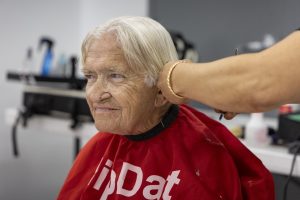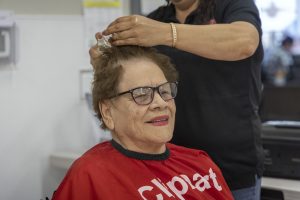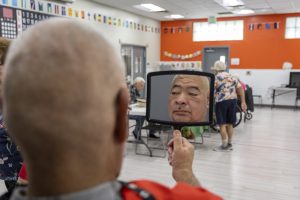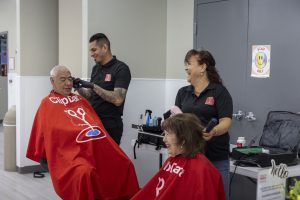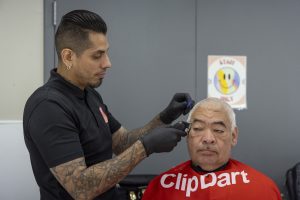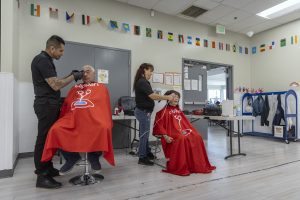- Slug: BC-CNS-ClipDart Haircuts. 790 words. David Ulloa Jr.
- Photos, file video available.
By David Ulloa Jr.
Cronkite News
GLENDALE – Surrounded by the low hum of clippers and the click of scissors cutting hair, a group of older adults sits at a long rectangular table in the Glendale Community Center. They place beans on Lotería cards – a traditional Mexican game similar to bingo – as one of the staffers calls out the names of icons on the playing cards, in broken yet well-intentioned Spanish. One client jumps up from her salon chair as soon as her haircut is done to join the rest of them to see if she can fill her card and yell “Lotería!” to win the game.
The barbers and hairstylists at the Glendale Community Center are part of a nonprofit organization called The ClipDart Giveback, a group of mobile barbers and hairstylists who help improve the mental health of vulnerable communities by providing an authentic barbershop and hair salon experience.
According to its website, ClipDart was founded in response to the disparity of students of color and vulnerable populations being able to access affordable, quality hair services from barbers or hairstylists, particularly those skilled at cutting the hair of people of color.
There are two pillars to ClipDart: ClipDart Inc. and The ClipDart Giveback.
ClipDart Inc. works with institutions to assist people of color at predominantly white colleges and in white areas who cannot access barbers that meet their cultural needs, such as cutting textured hair, according to the website. ClipDart organizes barbers to travel from nearby cities to provide these services.
The ClipDart Giveback is the nonprofit arm of the organization, according to its website, that partners with human services organizations across the nation to provide free, frequent haircuts to people in need.
David Rodriguez, barber and chief strategy officer of ClipDart, said the organization is growing quickly because there are many vulnerable people, especially in Black and Hispanic communities.
“Our demographic is large, but no one understands us like we do. When we have barbers and hairstylists coming to you, we can replace that culture you’ve lost if you go to other areas where there aren’t people like you,” Rodriguez said.
Rodriguez said that the organization is growing because its barbers and hairstylists recreate the barbershop experience and connect with their clients on a personal level.
When ClipDart sets up for an event, Rodriguez said he brings a chair similar to one in a barbershop and a mobile barber station, a case that contains all the tools he uses to cut hair. To further emulate a barbershop, Rodriguez often brings a speaker and plays the music that is popular with that particular community.
While they cut their clients’ hair, Rodriguez said the barbers and hairstylists have conversations with them about topics such as money, sports and their personal lives.
As he got his haircut, Daniel Holguin, a volunteer at the community center, said he likes Rodriguez because he is honest and does a good job cutting hair.
“He knows how to treat people and he talks to people in a respectable way,” Holguin said.
Rodriguez said the combination of the music and the professional mobile barber stations “completes the circle of having the barbershop experience.”
“It’s everything that a normal barbershop has, but we bring the experience of a barbershop to them; that’s why we are growing so fast,” Rodriguez said.
Moraima Robledo, a hair stylist of 25 years and volunteer with ClipDart, said she felt welcomed into the family created by the older adults at the Glendale Community Center.
“It’s a very beautiful thing because when we come, they say, ‘Here comes the lady!’ because they know we laugh and talk with them,” Robledo said.
Robledo said although it is not easy to get clients to hug barbers or hair stylists, her clients often hug her. She attributes her experience of working with special needs members of her family as the thing that has helped her form personal connections with clients.
ClipDart visits certain organizations frequently. Rodriguez said many of their clients already know them and often ask, “When are you going to come back?” when they leave.
Rodriguez said that is always a good sign because it means the client wants to make time to go to the barber or hairstylist frequently.
The upbeat scene that took place in the community center on the day Cronkite News visited can be compared to the 2002 movie “Barbershop,” about a day in the life of a barbershop on the southside of Chicago.
As the Lotería game continued, and as Rodriguez and Robledo brushed off excess hair to finish their clients’ haircuts, a visitor at the community center got up and started dancing to the beat of the cowbell and accordion in the Los Tucanes de Tijuana song, “El Tucanazo.”
For more stories from Cronkite News, visit cronkitenews.azpbs.org.
